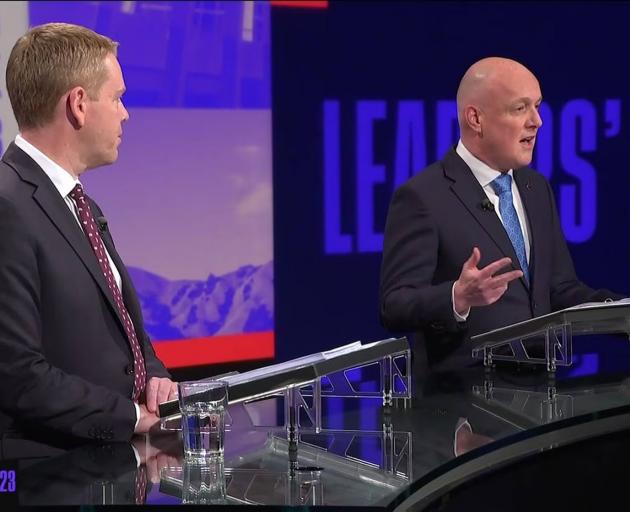
During the debate (which really was too long) Labour Party leader Chris Hipkins and National Party leader Christopher Luxon went head to head, although that sounds more dynamic that it really was. They maintained their political positions and held to their speaking points as they have over the campaign so far. There were no sparks of genius or moments of high amusement that we hope for in a debate. There were no points at which you would spontaneously cheer or clap enthusiastically for your guy. But there were a couple of moments of genuine passion, however muted.
One of those was during the health debate. Jessica Mutch-McKay asked Luxon "Should Māori and Pacific people should be prioritised over other patients with similar conditions? Māori die seven years earlier."
Luxon responded with "Public services should always be prioritised on the basis of need not ethnicity".
Hipkins, bless him, was clearly outraged as he went a bit pink.
He defended the need for Māori and Pacific to have their distinct systemic health disparities recognised and addressed by the health system.
"Māori and Pacific New Zealanders wait for longer for healthcare.
"Māori and Pacific New Zealanders should not be discriminated against by the health system, which there is clear evidence they have been in the past."
It was a rare moment of fire from Hipkins, and very welcome.
Luxon also said National supported a "by Māori, for Māori" system, but then went on to claim the Māori Health Authority created "two separate national systems", justifying his opposition to Māori oversight of the Māori health services Luxon says he wants to keep.
Luxon suffers from a logical fallacy. Luxon’s rhetoric is racist dog-whistling.

The policy argues for Māori health strategies to help drive and assess improvements to Māori health outcomes.
Contrary to campaign rhetoric, National’s policy recognises the inequity of the seven-year difference in life expectancy between Māori and Pākehā.
On paper National says one thing. On the campaign trail Luxon says another. And it matters because the racist dog-whistling and divisive politicking makes a difference to our people in accessing health services.
It influences the control of and access to critical health information that could save our lives. It influences whether we go to the doctor early enough, whether we get taken seriously when we do, whether we are diagnosed properly, prescribed the best medication, referred to a specialist, get on the waiting list quickly, are prioritised for surgery, get appropriate after-surgery care, get the right follow-up advice — whether we survive or not. This rhetoric is not a policy matter, it is a literal life-and-death question.
Will our people get the healthcare they need or will they suffer racist barriers and die young?
All the evidence says it is latter that is happening, and any whānau Māori can tell you story after story of exactly this happening to the people we love.
There are easy enough solutions here. First Luxon can quit with the racist dog-whistling.
In the leaders debate he said he had been "quietly" meeting with iwi leaders during the campaign. If by "quietly" he means so that his voter base does not know he is meeting with iwi leaders, well, he can quit with that deception too.
Luxon should be much clearer about his party’s position on recognising ethnicity is a determiner of health inequities and that his party wants to fix it.
No-one, except maybe David Seymour, will disagree that is a wise thing to do.
A 2009 Ministry of Health report on the economic cost of ill-health estimates the cost of long-term health conditions at about $100million per year per condition. If recognising ethnicity, alongside geography, gender and wealth helps to bring that very hefty, yet conservative figure down, then it is a perfectly rational policy and fiscally justifiable.
He could give effect to his support for a "by Māori, for Māori" approach and tell us how he will reform the Māori Health Authority if he does not like how Labour has done it. It’s new and it will undoubtedly have teething problems. It makes perfect sense to have a national-level Māori governing authority overseeing the effectiveness of National’s proposed Māori Health Strategy, which is delivered by state and Māori health providers in local communities to Māori people.
While Luxon might win over some Act New Zealand and New Zealand First voters, this rhetoric is not going to persuade the bulk of the Labour soft vote. They already swing every few elections and are clearly swinging his way in this election. He does not need to dog-whistle to the extremists to become yet another Pākehā, male, upper-middle-class prime minister. He does not need to make Māori the scapegoat of his campaign.
E te Wheao, kua whetūrangitia ki te pō, e okioki ana i runga i te ū o Hine-nui-te-pō, hei wāhanga nō te tātai toto rangatira o ngā tīpuna. Moe mai rā.
■Metiria Stanton Turei is a law lecturer at the University of Otago and a former Green Party MP and co-leader.












